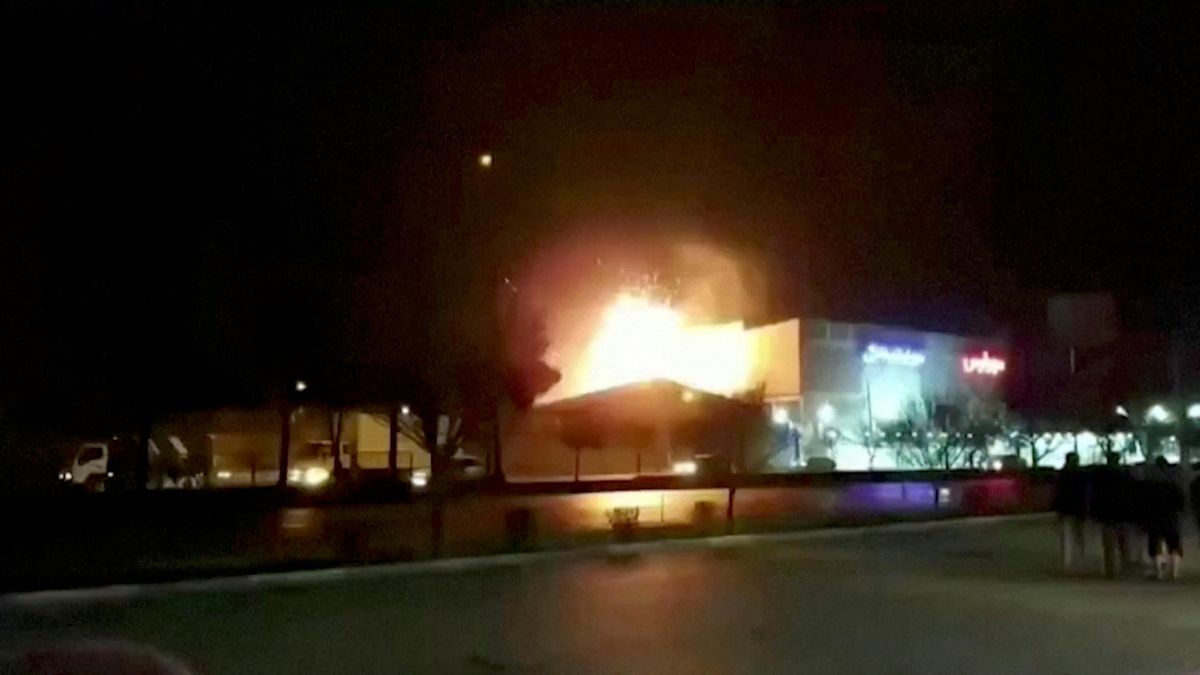What we know about the Isfahan attack
In what’s broadly believed to have been an Israeli attack, three drones hit an Iranian ammunition factory in the central city of Isfahan, Iran, on Saturday night. Iranian state media said damage to the site was “minor,” but phone footage suggests that the compound – used to produce advanced weapons and home to its Nuclear Fuel Research and Production Center – took a serious blow. An oil refinery in the country's northwest also broke out in flames on Saturday, though the cause remains unknown. Then, on Sunday night, a weapons convoy traveling from Syria to Iraq was also targeted by airstrikes. US reports attributed the Isfahan attack to Israel – which has in the past targeted nuclear sites in Natanz and hit Iranian convoys transporting weapons to Hezbollah in Lebanon. Indeed, this comes after Russia purchased hundreds of Iranian-made “suicide drones,” which it has used to pummel Ukrainian cities. While the deepening military alliance between Iran and Russia is a growing concern for Washington, it’s unclear if Uncle Sam played a role in the Isfahan hit – or whether Israel, which has to date refused to deliver heavy arms to Kyiv, agreed to carry out this attack in part to frustrate Iranian drone deliveries to the Russians. The escalation comes just days after CIA Director William Burns flew to Israel for meetings with his Israeli counterparts – and as US Secretary of State Antony Blinken heads to Israel and the West Bank this week. Crucially, it highlights the increasing overlap between Russia’s aggression in Ukraine and the longtime shadow war between Iran and Israel.
The battle for Bakhmut
Days after securing commitments from Germany and the US for advanced battle tanks, Kyiv says it’s engaged in “fast-track” talks with its Western counterparts for long-range missiles and military aircraft to provide cover for tanks in action. This comes after a weekend of heavy fighting outside Bakhmut, a flashpoint in eastern Ukraine and a critical supply route for the Russian military. However, German Chancellor Olaf Scholz does not seem to be on board with these arms deliveries – at least for now. Ukraine, for its part, has been targeting train lines around Bakhmut, specifically in villages that are well-positioned to act as hubs for Russia to bring reinforcements into southern Ukraine. Meanwhile, as the Russians pummeled the village of Kostyantnivka on Saturday, Ukraine reportedly hit a hospital in occupied Luhansk, saying it was being used as Russian military headquarters. As heavy fighting continues – and Russia reportedly prepares to call up more troops – Kyiv says it’s having increasing difficulty fending off Russian advances.
Czechs choose "calm"
In a second-round run-off, the Czech Republic elected retired general Petr Pavel as its new president. The pro-Europe, former NATO four-star officer beat populist Andrej Babis, a former PM, reaping 58.32% of the vote compared to his opponent's 42%. Three of the candidates who dropped out after the first-round backed Pavel in a contest marred by threats and disinformation – and cast as a fight between Pavel’s pro-Europe multilateralism and Babis’ populism, which resonated largely with rural voters. Pavel, a former chief of general staff of the Czech military, who vowed to "lead with experience and calm" wants to continue aiding Ukraine in lockstep with the West. Babis, who would have likely adopted many of the same policies as current populist President Milos Zeman, recently said he would not honor NATO’s mutual defense clause, but later walked that back. Even though the role of the president is largely ceremonial, the office still carries weight, including being responsible for choosing the prime minister and the central bank chief. Indeed, Pavel’s win reiterates the country’s pro-Western leanings and will be music to the ears of bureaucrats in Brussels.
Can Biden and McCarthy solve the debt limit crisis?
Newly confirmed House Speaker Kevin McCarthy said on Sunday that he will meet President Joe Biden at the White House on Wednesday to try and chart a path on raising the debt ceiling to avoid default. (For context on what the debt ceiling is and why it matters, see this GZERO explainer.) Interestingly, McCarthy said that cuts to Medicare and Social Security – which some fiscal hawks in his party had been pushing for – were “off the table.” Indeed, it’s a good sign that the two are set to meet face-to-face to try and solve a looming catastrophe, but they are still miles apart in finding common ground. Biden, for his part, says he won’t negotiate and that the Republican-controlled House needs to raise the debt limit without preconditions in order to avoid an economic crisis. But McCarthy – who is being held hostage by the far-right faction of his party that nearly torpedoed his speakership bid – can’t make many concessions on increasing the federal government’s borrowing capacity without putting himself at risk of being booted out by his own caucus. While neither side has much political wiggle room, emergency measures put in place by the US Treasury to avoid default will expire in June.


















